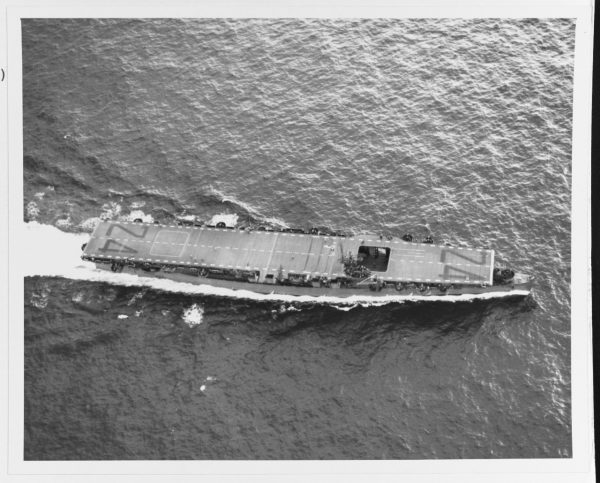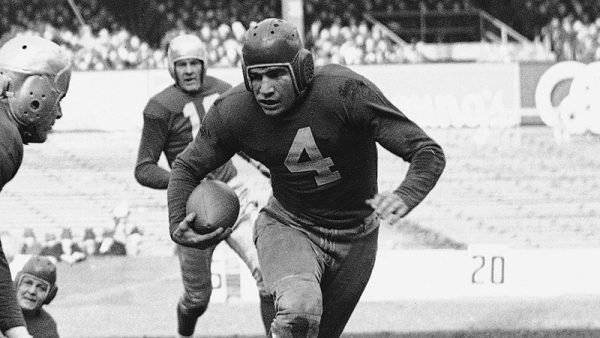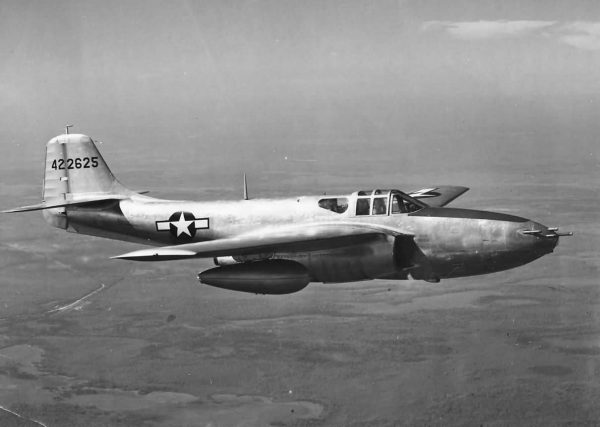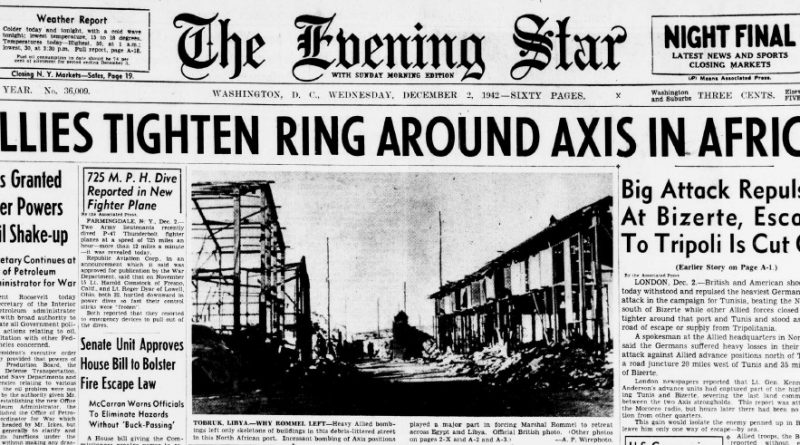World War II Chronicle: December 2, 1942
Click here for TODAY’S NEWSPAPER
At the bottom of today’s front page is a piece mentioning that Lt. Col. Boyd D. “Buzz” Wagner has gone missing. Wagner, once the youngest lieutenant colonel in the service, became the Army Air Force’s first ace on Dec. 16, 1941 over the Philippines. He was sent home to become an instructor pilot after notching eight victories in the Pacific… On the second page, New York Shipbuilding Corp. is preparing to launch the light carrier USS Belleau Wood, their third flattop since August. Belleau Wood was laid down in August 1941 and began construction as a Cleveland-class light cruiser. Sister ships USS Independence and USS Princeton were also originally designed as cruisers. All three will be commissioned by March and serve in the Pacific…

On page three, Pres. Roosevelt awards Capt. Harl Pease Jr.’s parents their son’s posthumous Medal of Honor (story on page 38)… American-born Pilot Officer Roy C. Munson, flying for the Royal Air Force Volunteer Reserve’s No. 150 Squadron, has been decorated with the Distinguished Flying Cross. From the London Gazette:
One night in August, 1942, this officer was captain of an aircraft detailed to attack Mainz. Whilst crossing the enemy coast on the outward flight, the aircraft was hit by anti-aircraft fire, sustaining damage to the port wing and the fuselage; several electric circuits also failed. In spite of this, Pilot Officer Munson resolutely flew on to his target, where he pressed home his attack. On the return journey his aircraft was attacked by a hostile fighter. The rear gunner was killed, the wireless operator wounded and the aircraft sustained further damage. The starboard engine was hit and various instruments, including the airspeed indicator, were put out of action. The controls became temporarily jammed but, after a great effort, Pilot Officer Munson managed to free them and decided to make an attempt to fly the aircraft back to this country. He eventually reached the English coast where he was compelled to effect a crash landing. This he did successfully in spite of difficulties. By his skill, courage and determination, this officer surmounted a most perilous situation, thereby safeguarding the lives of his crew and much valuable equipment.
George Washinton University has awarded Al Romasco the Tuffy Leemans Trophy for being the school’s best player in 1942 (page seven). Tuffy Leemans was an All American back for GWU in the 1930s and a star for the New York Giants after graduating. The Giants chose Dec. 7, 1941 to celebrate “Tuffy Leemans Day,” and during the game, the Polo Grounds’ PA announcer called for a William Donovan to phone “Operator 19” in Washington. The head of the Office of Strategic Services was about to learn that the Japanese had attacked Oahu, thrusting the the United States into war. Leemans’ number is retired and he is inducted into the NFL Hall of Fame.

Page eight reports that 51 servicemen have perished so far in the Boston Cocoanut Grove nightclub fire… Page 10 hints that the United States has numerous “secret” warplanes in the works. One is surely the Bell P-59A Airacomet — America’s first jet. After studying British jet technology, construction began in January and the plane was shipped across the country to Muroc Army Air Field (modern-day Edwards Air Force Base) where it first flew on Oct. 1, 1942. Everything about the plane was cloaked in secrecy, to the point that it was fitted with a phony propeller during handling…

George Fielding Eliot column on page 12… Famous singer Tony Martin has been discharged from the Navy for “unfitness.” The former chief petty officer was assigned entertainment duties on Naval Station Treasure Island and wastes no time speaking with his draft board about rejoining the Armed Forces… Sports section begins on page 50. Pictured on the next page are former Boston Red Sox teammates Ted Williams and Johnny Pesky, now sharing a cockpit as Naval aviation cadets during training at Amherst College…
And today marks the first dispatch from famous war correspondent Ernie Pyle, reporting from North Africa:
WITH THE AMERICAN FORCES IN ALGIERS – From now onward, stretching for months and months into the future, life is completely changed for thousands of American boys on this side of the earth. For at last they are in there fighting.
The jump from camp life into front-line living is just as great as the original jump from civilian life into the Army. Only those who served in the last war can conceive of the makeshift, deadly urgent, always-moving-onward complexion of front-line existence. And existence is exactly the word: it is nothing more.
The last of the comforts are gone. From now on you sleep in bedrolls under little tents. You wash whenever and wherever you can. You carry your food on your back when you are fighting.
You dig ditches for protection from bullets and from the chill north wind off the Mediterranean. There are no more hot-water taps. There are no post exchanges where you can buy cigarets. There are no movies.
When you speak to a civilian you have to wrestle with a foreign language. You carry just enough clothing to cover you, and no more. You don’t lug any knickknacks at all.
When our troops made their first landings in North Africa they went four days without even blankets, just catching a few hours sleep on the ground.
Everybody either lost or chucked aside some of his equipment. Like most troops going into battle for the first time, they all carried too much at first. Gradually they shed it. The boys tossed out personal gear from their musette bags and filled them with ammunition. The countryside for twenty miles around Oran was strewn with overcoats, field jackets and mess kits as the soldiers moved on the city.
Arabs will be going around for a whole generation clad in odd pieces of American Army uniforms.
At the moment our troops are bivouacked for miles around each of three large centers of occupation – Casablanca, Oran and Algiers. They are consolidating, fitting in replacements, making repairs – spending a few days taking a deep breath before moving on to other theaters of action
They are camped in every conceivable way. In the city of Oran some are billeted in office buildings, hotels and garages. Some are camping in parks and big vacant lots on the edge of town. Some are miles away, out in the country, living on treeless stretches of prairie. They are in tiny groups and in huge batches.
Some of the officers live in tents and sleep on the ground. Others have been lucky enough to commandeer a farmhouse or a barn, sometimes even a modern villa.
The tent camps look odd. The little low tents hold two men apiece and stretch as far as you can see.
There are negro camps as well as white.
You see men washing mess kits and clothing in five-gallon gasoline cans, heated over an open fire made from sticks and pieces of packing cases. They strip naked and take sponge baths in the heat of the day. In the quick cold of night they cuddle up in their bedrolls.
You see negroes playing baseball under the bright African sun during their spare hours of an afternoon.
The American soldier is quick in adapting himself to a new mode of living. Outfits which have been here only three days have dug vast networks of ditches three feet deep in the bare brown earth. They have rigged up a light here and there with a storage battery. They have gathered boards and made floors and sideboards for their tents to keep out the wind and sand. They have hung out their washing, and painted their names over the tent flaps. You even see a soldier sitting on his “front step” of an evening playing a violin.
They’ve been here only three days and they know they’re unlikely to be here three days more, but they patch up some kind of home nevertheless.
Even in this short waiting period life is far from static. Motor convoys roar along the highways. Everything is on a basis of “not a minute to spare.” There is a new spirit among the troops – a spirit of haste.
Planes pass constantly, eastbound. New detachments of troops wait for orders to move on. Old detachments tell you the stories of their first battle, and conjecture about the next one. People you’ve only recently met hand you slips of paper with their home addresses and say, “You know, in case something happens, would you mind writing…”
At last we are in it up to our necks, and everything is changed, even your outlook on life.
Swinging first and swinging to kill is all that matters now.
Evening star. (Washington, D.C.), December 2, 1942. Chronicling America: Historic American Newspapers. Lib. of Congress.
https://chroniclingamerica.loc.gov/lccn/sn83045462/1942-12-02/ed-1/

The United States made Europe Communist along with China.
Patton was right – we “fought the wrong enemy”.